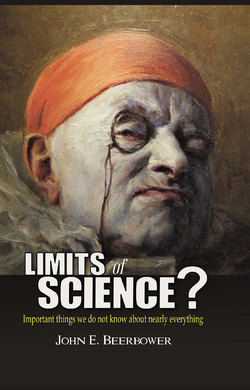Читать книгу Limits of Science? - John E. Beerbower - Страница 37
На сайте Литреса книга снята с продажи.
What is mathematics?
ОглавлениеGiven the diversity of mathematical techniques, one might want to ask exactly what is mathematics. “[S]ome writers have suggested, rather evasively, that mathematics is what mathematicians do. …A variation of th[at] definition … is that mathematics is what mathematics does.” Kline, Mathematics, p.3. The physicist Richard Feynman said that “Mathematics is a language plus reasoning; it is a language plus logic. Mathematics is a tool for reasoning. …Mathematics, then, is a way of going from one set of statements to another.” The Character of Physical Law (Modern Library Edition, 1994) (originally published by The British Broadcasting Corporation in 1965, based upon a series of lectures given at Cornell University in 1964), pp.34, 39. See also, e.g., Kline, Mathematics, pp.1–5 (“Mathematics is concerned primarily with what can be accomplished by reasoning”). (For a longer list of answers to the question, see Hacking, Why Is There Philosophy of Mathematics at All?, pp.41–7.)
Alfred North Whitehead, in an important essay about the nature of mathematics, wrote “arithmetic … applies to everything, to tastes and to sounds, to apples and to angels, to the ideas of the mind and to the bones of the body. The nature of the things is perfectly indifferent, of all things it is true … . Thus we write down as the leading characteristic of mathematics that it deals with properties and ideas which are applicable to things just because they are things.” An Introduction to Mathematics (1911), p.9. In this sense, mathematics is an “abstract science”—that is, it is independent of all of the physical characteristics, the location, the feelings or emotions and the surrounding circumstances or environment of the “things” to which it might be applied. As a result, the concept of mathematics is particularly relevant to the expression of scientific laws. The mathematics can capture the permanent, determinative relationship among things. Whitehead declared: “To see what is general in what is particular and what is permanent in what is transitory is the aim of scientific thought. …This possibility of disentangling the most complex evanescent circumstances into various examples of permanent laws is the controlling idea of modern thought.” Id., p.11. Thus, “all science as it grows towards perfection becomes mathematical in its ideas.” Id., p.14.
Nonetheless, Whitehead warned, “there is no more common error than to assume that, because prolonged and accurate mathematical calculations have been made, the application of the result to some fact of nature is absolutely certain. The conclusion of no argument can be more certain than the assumptions from which it starts.” Id., p.27. He goes on to discuss the fact that the Laws of Nature that constitute an important part of such assumptions may be wrong or, at best, only an approximation of reality.
For many of us, the basis of mathematics seems to be the systematic use of logic or reasoning3 or, worded differently, the creation of elaborate systems based upon rules of logic. Mathematics always appears as a system of definitions (or concepts) and rules of transformation. It may be that modern mathematics cannot all be reduced to a system of logic (id., pp.54–5), but I still think that it is useful to think of mathematics as systems of logic. Then, various criteria can be set out as to what constitutes a sound or valid logical system. Characteristics like internal consistency would seem to be of central importance. (Although, the need for that criterion has been challenged by Wittgenstein. Id., p.25.)
Such logical systems cannot in and of themselves be said to be true or false as we normally think of the concept of truth, i.e., as accurately or inaccurately reflecting some aspect of objective reality. That is the case because the logical or mathematical system as postulated has no factual content, no connection to objective reality external to the logical system itself. Rudolf Carnap expressed this thought in a more sweeping form: “It is true that the laws of logic and pure mathematics (not physical geometry, which is something else) are universal, but they tell us nothing whatever about the world. They merely state relations that hold between certain concepts, not because the world has such and such a structure, but only because those concepts are defined in certain ways.” Philosophical Foundations of Physics: An Introduction to the Philosophy of Science (1966), p.9. As already explored in connection with the use of models and theories, deductive logical systems, which most pure mathematics are, derive “true” conclusions from the stated premises as a matter of logical necessity, often as a matter merely of the definition of the terms. Such systems are self-contained and self-consistent. They simply do not touch the physical world.
Of course, some rather different sounding claims are often made about mathematics, along the lines of this recent statement: “Mathematical knowledge is unlike any other knowledge. Its truths are objective, necessary and timeless.” Edward Freckle “Is the Universe a Simulation?” The New York Times, Sunday Review, February 14, 2014. What does that mean? Is this the Platonic notion that mathematics has an existence separate from and independent of the world of objects we inhabit?
